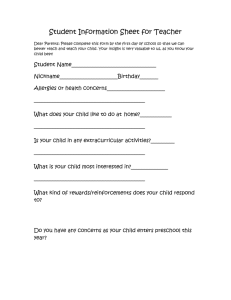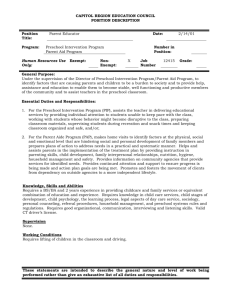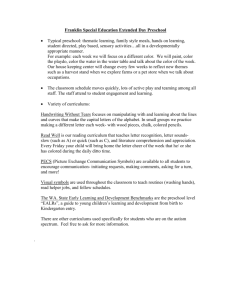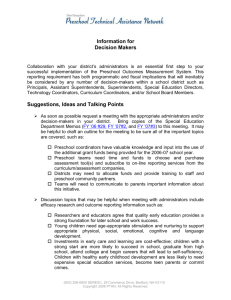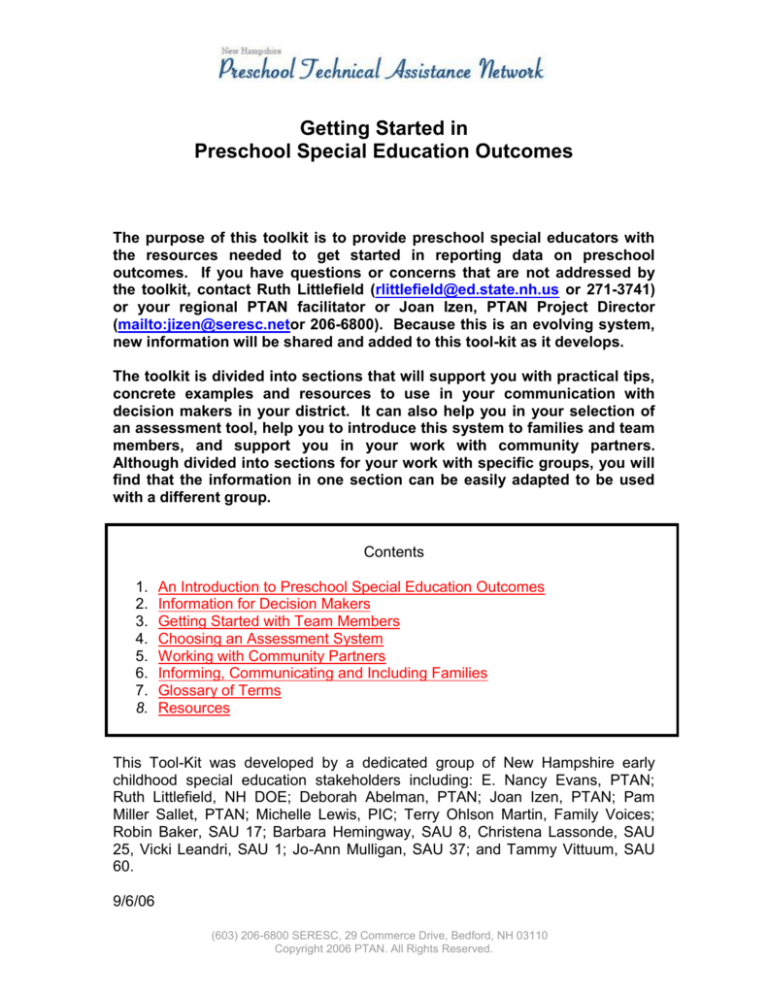
Getting Started in
Preschool Special Education Outcomes
The purpose of this toolkit is to provide preschool special educators with
the resources needed to get started in reporting data on preschool
outcomes. If you have questions or concerns that are not addressed by
the toolkit, contact Ruth Littlefield (rlittlefield@ed.state.nh.us or 271-3741)
or your regional PTAN facilitator or Joan Izen, PTAN Project Director
(mailto:jizen@seresc.netor 206-6800). Because this is an evolving system,
new information will be shared and added to this tool-kit as it develops.
The toolkit is divided into sections that will support you with practical tips,
concrete examples and resources to use in your communication with
decision makers in your district. It can also help you in your selection of
an assessment tool, help you to introduce this system to families and team
members, and support you in your work with community partners.
Although divided into sections for your work with specific groups, you will
find that the information in one section can be easily adapted to be used
with a different group.
Contents
1.
2.
3.
4.
5.
6.
7.
8.
An Introduction to Preschool Special Education Outcomes
Information for Decision Makers
Getting Started with Team Members
Choosing an Assessment System
Working with Community Partners
Informing, Communicating and Including Families
Glossary of Terms
Resources
This Tool-Kit was developed by a dedicated group of New Hampshire early
childhood special education stakeholders including: E. Nancy Evans, PTAN;
Ruth Littlefield, NH DOE; Deborah Abelman, PTAN; Joan Izen, PTAN; Pam
Miller Sallet, PTAN; Michelle Lewis, PIC; Terry Ohlson Martin, Family Voices;
Robin Baker, SAU 17; Barbara Hemingway, SAU 8, Christena Lassonde, SAU
25, Vicki Leandri, SAU 1; Jo-Ann Mulligan, SAU 37; and Tammy Vittuum, SAU
60.
9/6/06
(603) 206-6800 SERESC, 29 Commerce Drive, Bedford, NH 03110
Copyright 2006 PTAN. All Rights Reserved.
An Introduction to
Preschool Special Education Outcomes
In February 2007, all states including New Hampshire, must submit data to the
US Dept. of Education/Office of Special Education Programs (OSEP) to
demonstrate the effectiveness of its preschool special education programs. In
order to meet this requirement, local districts will begin to assess newly identified
children (children with an IEP) entering their preschool special education
programs as of November 1, 2006. Assessment will be in three outcome areas.
1. Children have positive social relationships.
2. Children acquire and use knowledge and skills.
3. Children take appropriate action to meet their needs.
To read more about the three outcome areas see the document, “Collecting and
Reporting Child and Family Outcomes Data for Program Improvement”.
The purpose of collecting and reporting this data is to assist with program and
service improvement efforts at the federal, state and local levels.
Federal - US Dept. of Education/Office of Special Education Programs
(OSEP) will use this information to demonstrate to Congress the effectiveness
of early intervention and preschool special education programs.
State - This data will assist state-level decisions about resources and
opportunities for training and technical assistance.
Local - Districts and programs will be able to use this data for program
development for whole groups of children within the district, to inform
instruction and interventions for individual children and to communicate
progress to families. This data can also be used to demonstrate effectiveness
and gain community support for preschool special education programs.
This initiative is new for all states and districts, as well as for early intervention
programs (New Hampshire Family-Centered Early Supports and Services ESS). We are all learning to build systems that will support us in demonstrating
the effectiveness of our programs by measuring child progress.
The Preschool Outcome Measurement System is ultimately about improving the
well-being of preschool children with disabilities. By working together on this new
requirement, we can enhance the quality of programs and services, resulting in
better outcomes for New Hampshire’s children.
Key points to consider as you begin to implement the Preschool Outcome
Measurement System are outlined specifically in the Bureau of Special Education
(603) 206-6800 SERESC, 29 Commerce Drive, Bedford, NH 03110
Copyright 2006 PTAN. All Rights Reserved.
FY ‘07 Memo #2 and the Bureau of Special Education FY ’07 Memo #3
(amending the beginning date of this requirement from September 1 to
November 1, 2006).
Families have critical information about their child’s strengths and how their
child is progressing. Their input should always be incorporated when
assessing a child.
The assessment tools recommended by the NH
Department of Education have detailed procedures for including families in
the assessment process.
Much work has already been done on both a national and state level to
determine which assessment tool/instrument are most desirable and most
readily used to assess and report child progress on the outcomes. Based on
considerable research and feedback from NH practitioners, the three tools
being recommended by the NH Department of Education for assessing
preschool outcomes are:
o Assessment, Evaluation, and Programming (AEPS®)
o Brigance® Inventory of Early Development II (IED-II)
o
The Creative Curriculum® Developmental Continuum Assessment for
Ages 3-5
Effective November 1, 2006, districts are required to assess all newly
identified preschool children with IEPs to determine each child’s status
relative to the three outcome areas. Districts will report this entry data to the
NHDOE. Local teams may find this assessment process useful for other
children; however it is required only for preschool children with IEPs
identified as of November 1, 2006. This assessment will occur within six
weeks of the child beginning to receive special education services. The sixweek time frame was selected to allow enough time for children and staff to
get to know each other, but not have so much time in the program that this
entry data reflects the benefits of special education. The benefits of special
education will be reflected in the exit data.
Assessments on the three outcomes will occur at least annually for each
child. Local teams may decide that assessments occur more frequently
based upon the selected assessment process, the assessment tool, the need
to inform curriculum and instruction, the need to report progress on IEP goals
and objectives and the needs of individual children.
For state-reporting purposes, progress on the outcomes will be
determined based on the first (entry) assessment data and the final
(exit) assessment data completed prior to the child exiting preschool
special education.
The NHDOE is working with publishers of the recommended tools and state
and national technical assistance providers to establish a comprehensive and
responsive plan for professional development and technical assistance. More
information about this plan is forthcoming.
Resources that will support you in getting started are included at the end of this
tool-kit.
(603) 206-6800 SERESC, 29 Commerce Drive, Bedford, NH 03110
Copyright 2006 PTAN. All Rights Reserved.


